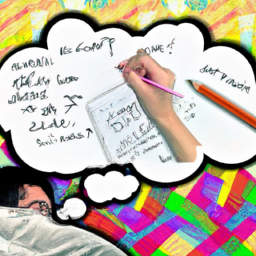Have you ever awakened from a dream convinced it was incredibly vivid and significant, only to lose the details shortly after? Our dreams serve as enigmatic communications from our subconscious, yet they can fade from our recollection as swiftly as they appear.
However, with some simple techniques and consistent practice, we can learn how to remember our dreams more clearly and use them as a tool for self-reflection and personal growth.
Our minds are like gardens, and our dreams are the seeds that grow in them. Just as a gardener tends to their plants with care and attention, we too must cultivate our ability to remember our dreams if we want to reap their benefits.
In this article, I will share with you some proven methods for improving dream recall that have been backed by scientific research. By following these steps, you can unlock the hidden wisdom of your subconscious mind and gain valuable insights into your inner world.
Key Takeaways
- Setting an intention to remember dreams before going to sleep and keeping a dream journal can improve dream recall and provide insights into the subconscious mind.
- Creating a dream-friendly environment, including adjusting lighting and reducing distractions, can promote relaxation and enhance the quality of sleep.
- Techniques such as visualization exercises and word associations can help improve memory retention and recall of key details from dreams.
- Dream interpretation and analysis, including paying attention to patterns and recurring themes, can provide context and offer interpretations, leading to greater self-awareness and the potential for lucid dreaming.
Set the Intention to Remember Your Dreams
To remember your dreams, it’s important to set the intention to do so before you go to sleep. This means actively telling yourself that you want to remember your dreams and that they’re valuable to you. By doing this, you’re signaling your brain that dream recall is important and should be prioritized.
There are several benefits of dream recall, including gaining insight into unresolved issues in our waking life, improving our creativity and problem-solving skills, and even experiencing lucid dreaming. However, remembering our dreams can be challenging for some people.
To improve dream memory, there are a few tips you can try. One is setting an alarm for halfway through the night to prompt yourself to wake up and write down any dreams you may have had so far. Another tip is to repeat a phrase or affirmation before falling asleep such as "I’ll remember my dreams"or "my dreams are important."
Keeping a dream journal is the next step in enhancing dream recall. Writing down details about each dream as soon as possible after waking up helps cement it in your memory and allows for reflection on its meaning later on. By consistently recording your dreams in a journal, over time you may start noticing patterns or themes that could offer deeper insights into your subconscious mind.
So, if you’re looking to unlock the mysteries of your own psyche through dreaming, try setting an intention before bed tonight and start keeping track of those nighttime adventures in a journal!
Keep a Dream Journal
Start capturing your dreams by keeping a journal where you jot down your experiences as soon as you wake up. Dream journaling is an effective way to improve dream recall and gain insights into the unconscious mind. By recording the details of your dreams, you can review them later for patterns, symbols, and themes that reveal hidden meanings.
Here are some tips on how to get started with dream journaling:
- Keep a pen and paper or a voice recorder next to your bed.
- Write down everything you remember about your dream, including emotions, colors, people, places, actions, and objects.
- Use descriptive language to capture the sensory experience of the dream.
- Don’t worry about spelling or grammar; just focus on getting the memories down.
Dream interpretation and analysis can be challenging without a record of your dreams. By writing them down in a journal regularly, you will develop better recall and access deeper levels of meaning. You may notice recurring elements in your dreams that reflect unresolved issues or desires in waking life. Analyzing these patterns can help you understand yourself better and make positive changes.
Now that you know how to keep a dream journal, let’s move on to visualization exercises. These practices can enhance your ability to remember dreams by increasing mental clarity and focus.
Practice Visualization Exercises
Visualizing your desired outcomes can be a powerful tool in improving mental clarity and focus. It allows you to tap into the power of your subconscious mind to achieve your goals.
Visualization benefits include reducing stress, increasing motivation, and enhancing creativity. By practicing visualization exercises regularly, you can train your mind to focus on positive thoughts and feelings.
One effective way to practice visualization is through guided meditation techniques. These involve listening to a recorded voice guiding you through a visualization exercise, usually with calming background music. Guided meditations can help you relax and let go of any distractions or negative thoughts that may interfere with your ability to visualize effectively.
Creating a dream-friendly environment involves several steps, including setting the right temperature in the room, minimizing external noise and light sources, using comfortable bedding and pillows, and incorporating relaxing scents like lavender or chamomile.
By creating an optimal sleep environment conducive to dreaming, you increase your chances of remembering your dreams upon waking up. Remembering dreams is important because it helps us gain insight into our subconscious mind and provides clues about unresolved issues in our lives that we may need to address.
Create a Dream-Friendly Environment
Creating a dream-friendly environment involves adjusting the temperature, reducing noise and light sources, and using comfortable bedding. It’s crucial to create an atmosphere that promotes relaxation and calmness. Here are four ways to create a dream-inducing environment:
-
Importance of lighting: The type of lighting in your room can affect the quality of your sleep. Bright lights or screens emit blue light that suppresses melatonin production, making it harder for you to fall asleep. Use dimmer lights or warm-toned bulbs to reduce exposure to blue light.
-
Comfortable bedding: Investing in high-quality pillows and blankets can go a long way in improving your sleep quality. Choose materials that feel soft against your skin and provide the right level of support for your neck and back.
-
Eliminating distractions: Remove any items from the bedroom that may distract you from sleeping, such as electronics or work-related documents. Keep the room tidy and organized to promote feelings of calmness.
-
Creating a calming atmosphere: Incorporate soothing scents like lavender or chamomile into your bedroom through essential oil diffusers or candles. Play relaxing music at low volumes to help lull you into sleep.
By creating an environment that promotes relaxation, you increase your chances of having vivid dreams that you can remember upon waking up. However, sometimes even with these adjustments, remembering dreams can still be challenging; that’s where mnemonic devices come in handy as reminders during the day-to-day hustle-bustle routine we live in today’s world!
Use Mnemonic Devices
As someone who’s always been fascinated by dreams, I’ve tried various methods to help me remember them more clearly.
One technique that’s proven effective is using mnemonic devices. By creating acronyms or word associations for key details from my dreams, I can easily recall them later on.
Additionally, repeating these details aloud helps solidify them in my memory and increases the chances of remembering even more aspects of the dream.
Overall, incorporating mnemonic devices into my dream journaling routine has greatly improved my ability to remember and analyze my dreams.
Create Acronyms or Word Associations
You’re not some forgetful goldfish, are you? Then it’s time to get creative with your memory by using acronyms or word associations to remember your dreams. Word association techniques have been proven to be effective in improving memory retention.
Here are some tips that you can use:
-
Use vivid and unusual words: The more unique the word is, the easier it will be for you to associate it with a specific dream. For example, if you dreamt about flying, try associating it with the word ‘euphoria’ instead of just ‘flying’.
-
Create an acronym: This is one of the easiest and most effective ways to remember your dreams. Simply take the first letter of each significant detail in your dream and create an acronym from them. For instance, if you had a dream about being chased by a dog while eating pizza at a park, you could create the acronym CDP (chased-dog-pizza) to help you remember.
-
Link it with something familiar: If there’s something familiar that can represent what happened in your dream, try linking it with that object or idea. For example, if your dream was about meeting someone new while riding a bicycle through a forest trail, try linking it with nature or adventure.
Using these memory retention tips will help improve your ability to remember your dreams vividly. Once you’ve created an association or acronym for key details in your dream, repeat them aloud as this will reinforce their position in your mind and make them easier for recall later on when needed without even realizing how much progress has been made!
Repeat Key Details Aloud
To reinforce the details of your dream in your memory, it’s important to use repetition techniques. One effective way to do this is by repeating key elements aloud using contractions. This will help you engage with the experience and make it more memorable.
When you wake up from a dream, try to recall as many details as possible and then repeat them aloud. For example, if you dreamt about flying over a mountain range, say out loud "I flew over mountains."Repeating this phrase several times will help anchor it in your memory and increase the chances of retaining that detail. Additionally, incorporating contractions like "I’ve"or "I’m"can help make the phrases easier to remember.
Using repetition techniques can significantly improve your memory retention of dreams. As you repeat key details aloud using contractions, you solidify those experiences in your mind and make them more accessible for future recollection.
So next time you wake up from a vivid dream, don’t forget to engage with it through repetition!
Engaging in creative activities can also enhance your ability to remember dreams. By immersing yourself in art or music or other imaginative pursuits during waking hours, you may find that these experiences carry over into your dreamscape and become easier to remember upon waking up.
Engage in Creative Activities
I’ve found that engaging in creative activities is a great way to remember and explore my dreams. Drawing, painting, or writing about my dreams helps me to delve deeper into the symbols and messages that may be hidden within them.
Additionally, using my dreams as inspiration for other creative projects has allowed me to tap into a rich source of imagery and ideas. By incorporating my dream experiences into my artistic endeavors, I’m able to gain new insights and perspectives on both my inner world and the outer world around me.
Draw, Paint, or Write About Your Dreams
Get creative with your dreams by drawing, painting, or writing about them! Artistic expression can be a powerful tool for dream interpretation.
When we engage in creative activities that involve our dreams, we’re able to access a deeper level of understanding and insight into their meaning. Drawing or painting your dreams can help you visualize the images and symbols that appeared in your dream. This process allows for a more detailed exploration of the subconscious mind and can provide clues as to what your dream may be trying to communicate.
Writing about your dreams is another effective way to gain insight into their meaning. By putting pen to paper, you’re able to capture the emotions and feelings associated with your dream, which can reveal important information about its message.
Incorporating artistic expression into your dream analysis can make the process more engaging and enjoyable while also providing valuable insights into yourself and your subconscious mind. So why not give it a try? Use your creativity to explore the mysteries of your dreams!
By using dreams as inspiration for creative projects, you tap into a rich source of ideas that are unique and personal to you. Whether it’s writing a short story based on one of your dreams or creating artwork inspired by its imagery, using dreams as inspiration can lead to some truly incredible work.
It’s also an opportunity to explore different mediums and styles of art that you may not have tried before, which can be both challenging and rewarding. So don’t let those vivid dreamscapes go unexplored – use them as fuel for creative expression!
Use Dreams as Inspiration for Creative Projects
Let your creativity run wild and let dreams inspire your next artistic project! Dreams are a rich source of symbolism that can help you tap into your subconscious mind. By exploring the images, themes, and emotions that arise in your dreams, you can gain insight into your deepest desires, fears, and aspirations.
Whether you’re a writer, artist, musician, or designer, using dream imagery in your work can add depth and meaning to your creative projects. One way to use dreams as inspiration for creative projects is to look for recurring symbols or themes in your dreams.
For example, if you often dream about flying or falling, this could symbolize a desire for freedom or a fear of losing control. By incorporating these symbols into your art or writing, you can explore these deeper meanings and connect with others who share similar experiences.
Additionally, by using dreams for problem-solving, you can find solutions to real-life problems through dream analysis. Using these techniques will not only expand your creative horizons but also help develop self-awareness and emotional intelligence.
By sharing our dreams with others, we become more aware of their significance and how they affect us emotionally.
Share Your Dreams with Others
I’ve found that sharing my dreams with others has been a valuable tool in understanding them better.
Joining a dream group or forum provides an opportunity to connect with like-minded individuals who are also interested in exploring the meanings behind their dreams.
Additionally, talking to friends and family about my dreams has opened up new perspectives and interpretations that I may not have considered on my own.
By sharing our dreams with others, we can gain insight into our subconscious minds and deepen our understanding of ourselves.
Join a Dream Group or Forum
You can easily join a dream group or forum to enhance your dream recall. By joining these groups, you’ll find like-minded individuals who are interested in exploring the realm of dreams. You can share your experiences and learn from others who’ve had similar or different experiences.
Finding dream buddies is also a great way to keep yourself accountable for remembering your dreams. You can set goals together and check in with each other regularly, which’ll help motivate you to stay on track. Additionally, being part of a community that values dreaming can be incredibly fulfilling and provide a sense of belonging.
Talking about our dreams with others is an important aspect of enhancing our dream recall. By sharing our experiences, we gain insights into ourselves and the world around us.
In the next section, we’ll explore how talking to friends and family about our dreams can deepen our understanding of ourselves and strengthen our relationships with others.
Talk to Friends and Family About Your Dreams
Engaging in conversations with loved ones about the symbolism and emotions present in your dreams can be a rewarding experience. It not only provides an opportunity to strengthen your relationships, but it can also lead to a deeper understanding of yourself.
Interpreting symbols and analyzing emotions is key to unlocking the true meaning behind your dreams. By discussing these aspects with those close to you, you may gain fresh perspectives and insights that you hadn’t considered before.
Analyzing dream characters and events is another important aspect of interpreting your dreams. When talking with friends or family members, try to recall specific details from your dream, such as who was present or what happened during certain events. This can help others understand the context of your dream and offer their own interpretations.
As you engage in these discussions, pay attention to patterns and themes that occur across multiple dreams. By recognizing recurring elements within your dreams, you can begin to unravel their significance and gain further insight into your subconscious mind.
Pay Attention to Patterns and Themes
Notice any recurring patterns or themes in your dreams to help improve dream recall. Identifying patterns in dreams can be a helpful tool in analyzing the meaning of our dreams. It is common for individuals to have reoccurring symbols or themes that appear in their dreams, such as flying, falling, or being chased. By recognizing these patterns and symbols, we can start to decipher what our unconscious mind is trying to communicate.
Analyzing dream symbols can give us insight into our subconscious thoughts and emotions. For example, if someone frequently has dreams about falling, it may indicate a fear of failure or loss of control. Similarly, if someone often dreams about water, it may signify an emotional state of uncertainty or change. By paying attention to these patterns and symbols, we can begin to understand ourselves on a deeper level.
Incorporating this practice into our daily routine can also lead to more vivid and memorable dreaming experiences. As we become more aware of the patterns and symbols within our dreams, we are training our brain to remember them more easily. This increased awareness may also lead us towards lucid dreaming – a state where we are aware that we are dreaming while still within the dream itself.
By noticing recurring patterns and analyzing dream symbols, we gain valuable insights into our subconscious mind. This not only helps us better understand ourselves but also leads us towards greater self-awareness through lucid dreaming experiences. Now let’s explore ways in which we can experiment with lucid dreaming without going too far out of our comfort zone!
Experiment with Lucid Dreaming
As I mentioned earlier, paying attention to patterns and themes in your dreams can help you remember them more vividly. But if you want to take it a step further, you can experiment with lucid dreaming techniques.
Lucid dreaming refers to the ability to become aware that you are dreaming and even control the content of your dreams. There are several techniques that can help increase your chances of having a lucid dream.
One popular technique is reality testing, where you regularly check throughout the day whether or not you are dreaming by asking yourself if what’s happening around you could be a dream. Another technique is keeping a dream journal, where you record your dreams each morning as soon as you wake up.
This helps train your brain to pay more attention to your dreams and recognize when they are occurring. The benefits of lucid dreaming go beyond just remembering your dreams more clearly. It can also help improve problem-solving skills, reduce anxiety, and increase creativity.
However, it takes time and practice to master these techniques and achieve a lucid dream state consistently. So be patient and persistent in your efforts to remember and control your dreams.
While experimenting with lucid dreaming can be an exciting way to enhance dream recall, it’s important not to get discouraged if results don’t come immediately. Let’s talk about being patient and persistent in our efforts next.
Be Patient and Persistent
Don’t even think about giving up yet, because becoming a master of dream recall and lucid dreaming takes time and persistence. It’s important to approach this process with the right mindset, as well as to prioritize getting enough quality sleep each night. Here are some tips that can help you achieve success in your journey towards remembering your dreams.
Firstly, it’s essential to be consistent with your dream journaling practice. This means writing down any details you remember from your dreams as soon as you wake up, even if it’s just a vague feeling or image. Over time, you’ll start to notice patterns and recurring themes in your dreams, which will make them easier to remember and analyze.
Another important aspect is making sure you’re getting enough high-quality sleep each night. This means creating a relaxing bedtime routine and sticking to a regular sleep schedule. When we’re sleep-deprived, our brain has a harder time retaining memories from our dreams, so ensuring that we’re well-rested can greatly improve our ability to remember them.
| Mindset Tips | Importance of Sleep |
|---|---|
| Stay positive and persistent | Prioritize quality sleep |
| Believe in yourself and your abilities | Create a relaxing bedtime routine |
| Celebrate small successes along the way | Stick to a regular sleep schedule |
Overall, mastering the art of dream recall and lucid dreaming takes dedication and patience. By adopting the right mindset and taking care of our physical wellbeing through proper sleep hygiene practices, we can greatly improve our chances of successfully recalling our dreams on a regular basis. Remember that every small step counts towards achieving this goal – so don’t give up!
Frequently Asked Questions
What are the benefits of remembering your dreams?
Remembering dreams leads to improved creativity and enhanced problem-solving abilities. Studies show that dream recall is linked to increased brain activity in areas responsible for these skills. Serving others becomes easier when we can tap into our full potential.
Can certain foods or supplements help with dream recall?
Certain foods and supplements may aid in dream recall, but more research is needed. Techniques such as journaling and reality checks can improve memory. Regular sleep patterns also enhance dream retention.
How long should I wait before writing in my dream journal after waking up?
Before writing in my dream journal upon waking up, I mentally prepare myself by recalling the details of my dream. The format includes a date, title, and description of the dream. This practice improves dream recall and aids in self-discovery.
Are there any risks or dangers associated with Lucid Dreaming?
Lucid dreaming can be an exciting experience, but it’s important to take precautions to ensure safety. Balancing dream recall with sleep quality is crucial. Potential discussion ideas include reality checks and setting intentions before bed.
How do I know if I’m making progress in remembering my dreams?
To gauge progress in remembering dreams, I use dream journaling tips like writing down details as soon as I wake up. Techniques for improving dream recall include setting intentions before bed and creating a consistent sleep routine.
Conclusion
In conclusion, remembering dreams can be a challenging task for most of us. However, we can increase our chances of recalling more vivid dreams by setting the intention to remember them, keeping a dream journal, practicing visualization exercises, and creating a dream-friendly environment.
Additionally, using mnemonic devices such as repeating key phrases or images before going to bed and sharing our dreams with others can also enhance our memory retention. It’s important to pay attention to patterns and themes in our dreams and experiment with lucid dreaming to gain insights into our subconscious mind.
It may take some time to develop these skills, but with patience and persistence, we can train ourselves to remember more of what happens during sleep. As the famous philosopher Aristotle said: "The best way to remember anything is through association."So let’s associate positive thoughts with dream recall and see how far it takes us on this journey of self-discovery.










